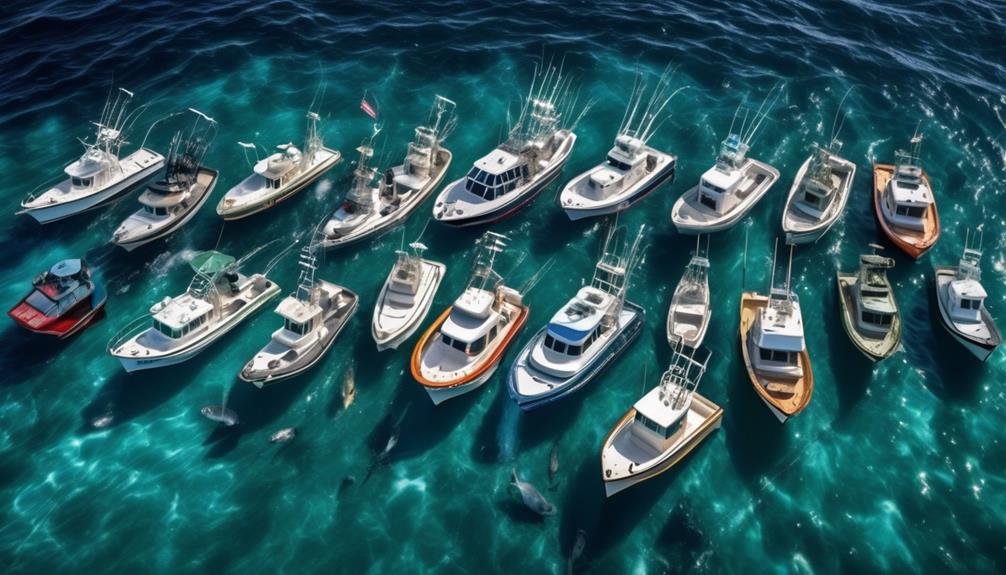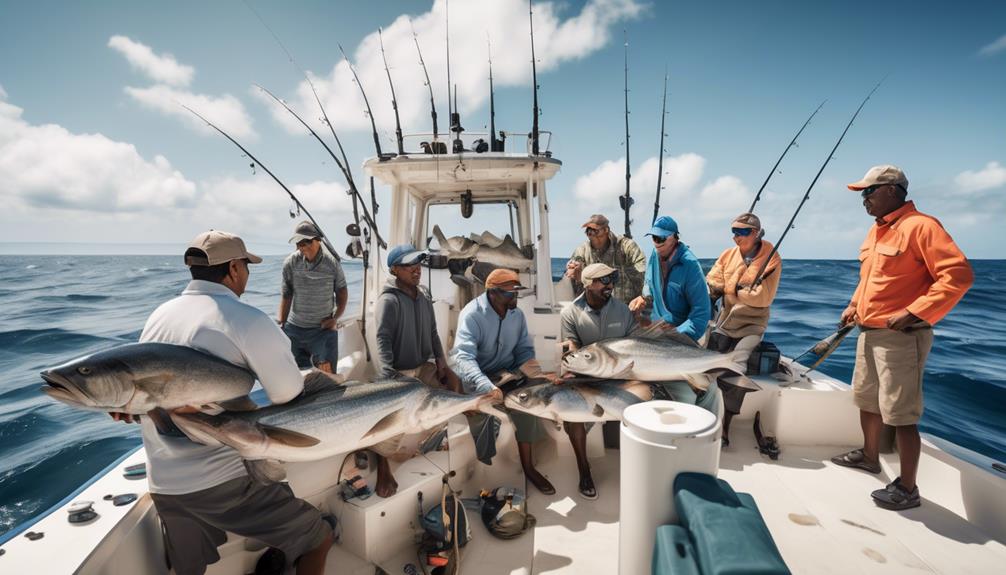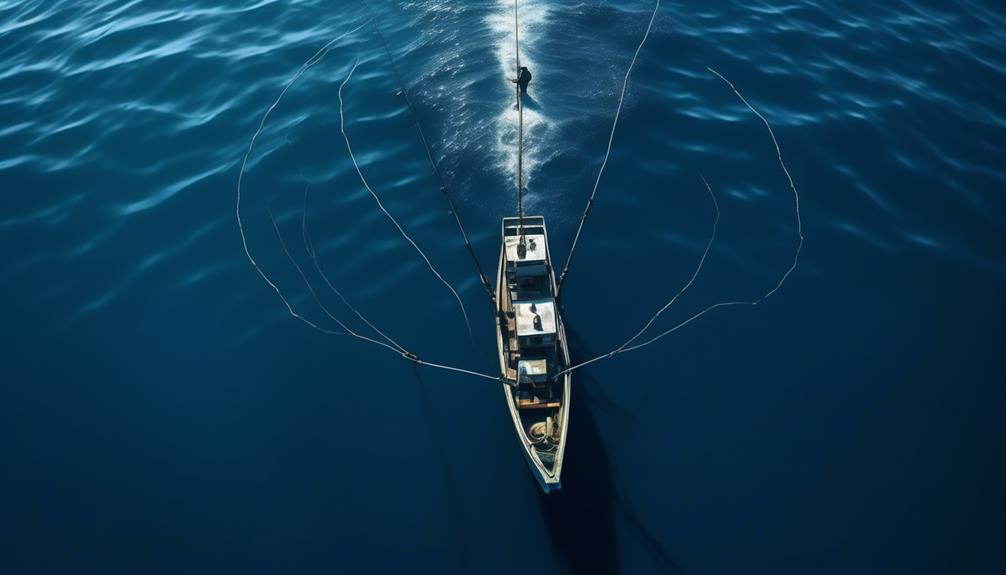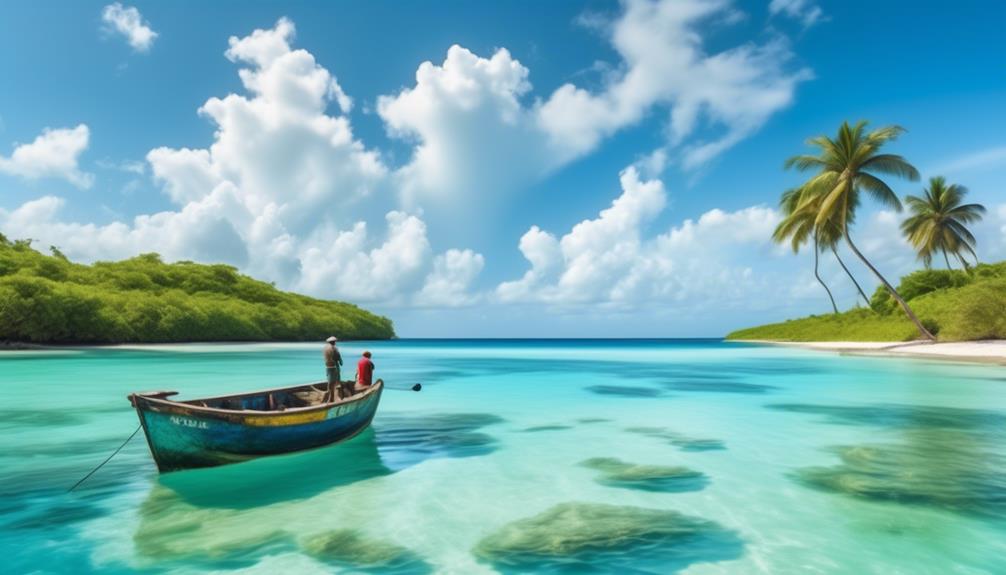So, you've decided to plan a deep sea fishing trip with your friends, and you're wondering what gear and equipment you'll need to ensure a successful and enjoyable experience. From sturdy rods and reels designed to handle the demands of deep sea fishing to specialized tackle and lures that attract the big game fish you're after, there's a lot to consider when it comes to gearing up for this adventure.
But that's just the beginning. Before you set sail, there are several other crucial items you'll need to have on hand to make the most of your deep sea fishing expedition.
Rods and Reels
When selecting deep sea fishing gear, it's essential to choose rods and reels that can withstand the harsh conditions of the open water. Finding the right combination for different fish species is crucial for a successful deep sea fishing experience.
For larger game fish like marlin or tuna, heavy-duty rods and reels with a high line capacity are necessary. Look for a rod that provides enough backbone to handle the weight and strength of these impressive creatures. Reels with a smooth drag system and sturdy gears are essential to handle the powerful runs and long fights often associated with these species.
On the other hand, when targeting smaller fish such as snapper or grouper, lighter rods and reels can be used. These fish may not require the sheer power of heavy tackle, but they do demand precision and finesse. Choose a rod that offers sensitivity to feel the subtle bites and a reel with a reliable drag to control the fish as it tries to escape into the structure.
Maintenance tips for keeping your gear in top condition include rinsing rods and reels with freshwater after each use to remove salt and any sand or debris that could cause damage. Regularly check and lubricate the reel's moving parts to ensure smooth operation and prevent corrosion. Additionally, store rods and reels in a cool, dry place to avoid any potential damage from humidity or extreme temperatures. Taking care of your gear will prolong its lifespan and ensure it performs at its best when out on the open water.
Tackle and Lures
To maximize your deep sea fishing success, ensure you have the right tackle and lures to complement your choice of rods and reels for different fish species. Choosing the right bait and lures for deep sea fishing is crucial for enticing the specific fish you're targeting. Research the type of fish you're aiming to catch and select lures that mimic their natural prey.
For example, if you're targeting larger pelagic fish like tuna or mahi-mahi, consider using large, brightly colored lures that resemble flying fish or squid. On the other hand, for bottom-dwelling species such as grouper or snapper, opt for lead-headed jigs or soft plastic lures that can be bounced along the ocean floor to entice a strike.
Techniques for effectively using tackle and lures in deep sea fishing involve understanding the behavior of the targeted fish and adjusting your approach accordingly. When using artificial lures, varying your retrieval speed and adding erratic movements can make the lure more appealing to predatory fish.
Additionally, when deploying live bait, it's important to present it in a natural and enticing manner. This may involve using specialized rigs such as a fish finder rig for presenting live bait off the bottom or a popping cork rig for suspending live bait at various depths in the water column.
Safety and Navigation Equipment
Ensure you have essential safety and navigation equipment on board to guarantee a secure and successful deep sea fishing trip.
Safety equipment is paramount for deep sea fishing. Life jackets or personal flotation devices (PFDs) are a crucial part of your safety gear. Ensure there are enough PFDs for every person on board, and that they're easily accessible. Additionally, having a throwable flotation device, such as a lifebuoy or rescue sling, is important in case of a man-overboard situation.
GPS navigation is indispensable for deep sea fishing. A GPS device will help you navigate the open waters, mark fishing spots, and find your way back to shore. It's also essential to have emergency protocols in place. This includes knowing how to operate and read the GPS for coordinates, and having a clear plan for what to do in case of an emergency.
Communication devices are vital for ensuring safety on a deep sea fishing trip. A VHF marine radio is the primary means of communication on the water. It allows you to contact other boats, the coast guard, or nearby vessels in case of an emergency. Additionally, having a fully charged cell phone in a waterproof case is a good backup communication device. It can be used to call for help if you're within range of a cell tower. Always ensure that your communication devices are in good working condition before heading out.
Clothing and Accessories
With safety and navigation equipment in place, the right clothing and accessories can enhance your comfort and performance during deep sea fishing trips. When preparing for a day out on the open sea, it's essential to consider your clothing and accessories to ensure a safe and enjoyable experience. Here are a few key items to consider:
- Proper Footwear: Wearing the right footwear is crucial for navigating the wet and slippery surfaces of a fishing boat. Choose non-slip, waterproof shoes that provide good traction to prevent any accidents while on board.
- Sun Protection: Shielding yourself from the sun's harsh rays is important during long hours spent out on the water. Opt for lightweight, long-sleeved shirts, wide-brimmed hats, and sunscreen to protect your skin from sunburn and potential long-term damage.
- Rain Gear: Weather conditions at sea can be unpredictable, so it's wise to pack waterproof jackets and pants to stay dry in case of sudden downpours. Staying warm and dry will help you focus on the fishing rather than worrying about the weather.
- Sunglasses: Invest in a good pair of polarized sunglasses to reduce glare from the water's surface. Not only do they protect your eyes from harmful UV rays, but they also enhance visibility, making it easier to spot fish and navigate the waters.
Electronics and Communication Devices
Navigating the open sea requires reliable electronics and communication devices to ensure your safety and connectivity while deep sea fishing.
One essential piece of equipment is a GPS navigation system. This device is crucial for determining your exact location, marking productive fishing spots, and most importantly, finding your way back to shore. Look for a marine GPS that's waterproof, has a clear display, and offers features such as waypoints and route planning to enhance your fishing experience.
In addition to GPS, VHF radios are indispensable for communication and safety at sea. VHF radios allow you to stay in touch with other boats, harbor masters, and the Coast Guard. In emergencies, they provide a vital lifeline for calling for assistance. When choosing a VHF radio, opt for one with digital selective calling (DSC) capabilities, which enables automatic distress signaling and the transmission of your vessel's precise location in case of an emergency.
When selecting electronics and communication devices for deep sea fishing, it's crucial to prioritize reliability and durability. Ensure that these devices are resistant to water, corrosion, and rough handling, as they'll be exposed to harsh marine conditions.
Bait and Chumming Equipment
Prioritize selecting high-quality bait and chumming equipment that will attract a variety of deep-sea fish species while remaining durable in harsh marine conditions. When it comes to bait and chumming equipment, the right tools can make all the difference in your deep-sea fishing experience. Here are some essential considerations to keep in mind:
- Chumming Techniques: Utilize effective chumming techniques to create a steady stream of scent and bait particles in the water, attracting fish to your location. Understanding the behavior of different fish species and adjusting your chumming strategy accordingly can significantly improve your chances of a successful catch.
- Environmental Impact: Be mindful of the environmental impact of chumming. Opt for biodegradable and environmentally friendly chumming products to minimize any negative effects on the marine ecosystem. Responsible chumming practices help preserve the delicate balance of the ocean environment.
- Bait Preservation: Invest in equipment that ensures proper bait preservation. Keeping your bait fresh and secure is crucial for enticing fish to bite. Consider options such as insulated bait containers or live bait wells to maintain the quality of your bait throughout your fishing trip.
- Scent Dispersal: Choose chumming equipment that facilitates efficient scent dispersal in the water. The ability to disperse enticing scents effectively can attract a wider range of deep-sea fish species to your fishing area, increasing your chances of a successful and diverse catch.
Storage and Organization Solutions
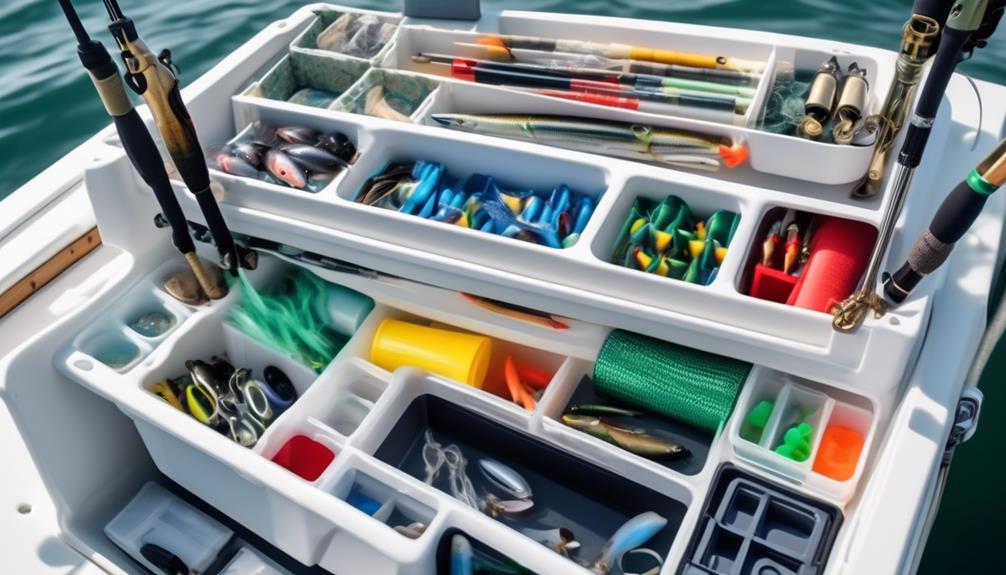
Invest in a durable tackle box or storage system to keep your deep-sea fishing gear and equipment organized and easily accessible during your fishing excursions. A tackle box is essential for storing your various lures, hooks, lines, and other small fishing accessories. Look for a tackle box with sturdy latches and multiple compartments to keep everything neatly organized. It's also helpful to choose a tackle box with a waterproof seal to protect your gear from the elements.
Additionally, consider investing in a quality fish bag to store your catch. A fish bag is designed to keep your fish fresh while out at sea. Look for a bag with thick insulation to maintain the proper temperature for your fish. Some fish bags also come equipped with UV-resistant material to protect your catch from the sun's rays. A durable fish bag with reinforced handles will make it easier to transport your fish back to shore.
To further optimize your storage and organization, consider using plastic storage containers for items like extra line, leaders, and sinkers. These containers can be easily stowed away in your boat and provide an additional layer of protection against moisture.
Maintenance and Cleaning Tools
Consider incorporating a regular cleaning routine using specialized tools to maintain the longevity and performance of your deep-sea fishing equipment. Regular maintenance and cleaning not only ensure that your gear lasts longer but also functions at its best when out on the water.
Here are some essential cleaning tools and tips for your deep-sea fishing equipment:
- Cleaning Tools: Invest in a set of specialized cleaning tools such as a fishing reel lubricant, corrosion inhibitors, and a soft-bristled brush. These tools are designed to effectively remove salt, sand, and debris without causing damage to your equipment.
- Maintenance Schedule: Establish a regular maintenance schedule to keep your gear in top condition. Whether it's after every fishing trip or at the end of the season, a consistent schedule will help prevent corrosion and extend the life of your equipment.
- Cleaning Supplies: Stock up on cleaning supplies like gentle soap, freshwater rinse buckets, and microfiber cloths. These supplies are essential for removing salt deposits and grime without harming the sensitive components of your gear.
- Equipment Care: Take the time to thoroughly clean and inspect each piece of equipment. Pay special attention to reels, rods, and tackle boxes, as they're most susceptible to saltwater damage.
Frequently Asked Questions
What Are the Best Types of Sunscreen and Sun Protection to Use for Deep Sea Fishing?
When deep sea fishing, you'll need high SPF sunscreen and water-resistant sun protection to shield you from the intense rays. Wear polarized sunglasses for glare reduction and consider UV protective clothing for added defense.
Are There Any Specific First Aid Kits or Medical Supplies That Are Recommended for Deep Sea Fishing Trips?
When deep sea fishing, it's essential to have a well-stocked first aid kit and medical supplies on hand. It's crucial for handling any injuries or emergencies that may arise during your trip. Proper disposal of medical waste is also important.
How Do I Properly Dispose of Used Fishing Line and Other Waste While Out at Sea?
When out at sea, it's crucial to properly dispose of used fishing line and other waste to minimize the environmental impact and preserve marine life. Recycling fishing line and utilizing designated waste containers are essential practices to follow.
Are There Any Specific Types of Snacks or Food That Are Best for Long Deep Sea Fishing Trips?
When going on long deep sea fishing trips, it's important to bring along nutritional snacks and stay hydrated. Pack non-perishable items like nuts, jerky, and granola bars, and don't forget to drink plenty of water to keep your energy up.
What Are the Best Methods for Cleaning and Maintaining Fishing Equipment After a Deep Sea Fishing Trip?
To maintain your fishing equipment after a deep sea trip, rinse gear with freshwater, remove all salt and debris, and dry thoroughly. Oil and grease moving parts, inspect for damage, and store in a cool, dry place.
Conclusion
So there you have it – with the right gear and equipment, you can have a successful and enjoyable deep sea fishing trip.
Make sure you have the proper rods and reels, tackle and lures, safety and navigation equipment, clothing and accessories, electronics and communication devices, bait and chumming equipment, storage and organization solutions, and maintenance and cleaning tools.
With everything in place, you'll be ready to reel in the big catch on your next deep sea adventure.
